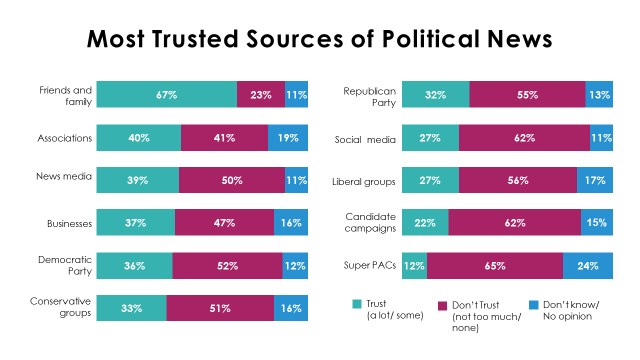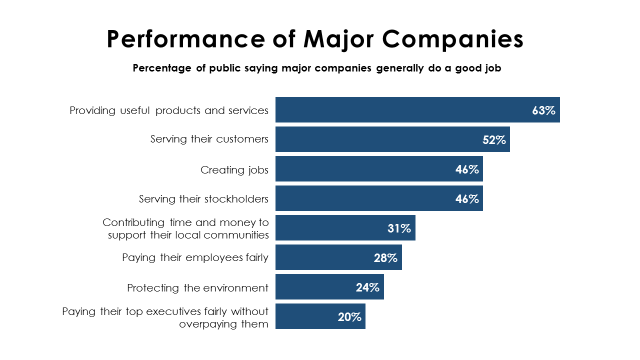
If Washington, D.C., is “The Swamp,” what exactly is swampy about it and who is to blame? According to a new poll from the Public Affairs Council, politicians themselves account for the four most serious problems with politics in the nation’s capital.
Of 10 distinct behaviors tested, the number-one concern is politicians more worried about getting re-elected than making good decisions, followed by politicians profiting from their time in office, intense partisanship getting in the way of progress, and politicians spending too much time raising money for their re-elections. Remarkably, Democrats and Republicans largely agree these problems are the most serious ones.
The poll of 2,200 Americans, conducted in late August by Morning Consult, also explores the efficacy of President Trump’s tweets, the most trusted sources of political news, sector-specific levels of trust, and public attitudes about small and large companies.
Trump’s Tweets have Limited Impact
It turns out that President Trump’s tweets are not read as widely as journalists and the White House often assume. Only 15% of the public read his tweets very often — either directly or as reported in the news media. Sixty-three percent report they rarely or never pay attention to his tweets.
Among Trump’s base — those who strongly approve of the job he’s doing as president — only 29% read his tweets very often, 30% read them somewhat often and 42% rarely or never read his tweets at all.
This year’s data also confirm the 2018 survey finding that when Trump criticizes a company on Twitter, more than 80% of Americans don’t change their opinion, don’t understand what he is talking about or just don’t know what to think. Only 11% say they have a less favorable opinion of a company picked on by POTUS.
News Media Losing Public’s Trust
The news media used to be the most trusted source of political news — but not anymore. Over the past year, attitudes about the American media have become increasingly negative.
Only 39% consider the news media trustworthy, compared with 50% who say they trust the media “not too much” or none. In 2018 46% said it was a trustworthy source of political news and information and only 43% disagreed.
The differences in opinion among Republicans, Democrats and Independents are striking. Democrats still generally trust the news media, with 58% saying they trust it at least somewhat and only 32% saying they have little or no trust. Just 23% of Republicans, however, have at least some trust in the news media and 69% have little or no trust. Independents also tend to be negative about the press, with 33% having some trust and 50% having little or no trust.

As in 2018, the most trusted source for political news and information is friends and family, with 67% saying they trust this source “some” or “a lot.” Next in line are trade and professional associations with a trust score of 40%.
Trust in social media has declined four percentage points since 2018. Age correlates closely with rising distrust in social media — but even 18-29-year-olds are skeptical of social media as a source of political news and information. While one-third of this age group (34%) have “some” or “a lot” of trust in social media, 49% have “not too much” or “none.”
Where Companies Succeed and Fail
Favorability of major companies rose slightly from 46% in 2018 to 48% in 2019, with 38% saying they have an unfavorable opinion. Trump supporters give major companies higher scores (59% favorability) than do Trump opponents (41%). Small business favorability continues to be high (85%) while non-favorability is only 5%.
Industry sectors considered least trustworthy include pharmaceuticals, health insurance, banks, energy and technology. Not coincidentally, these sectors are also rated most in need of new regulations.
Many Americans say major companies generally do a good job providing useful products and services (63%), serving their customers (52%), creating jobs (46%) and serving stockholders (46%).

Only 20%, however, say companies are doing a good job paying their top executives fairly, without overpaying them; and only 28% said they are doing a good job paying regular employees fairly. Major companies also receive low scores for protecting the environment (24%) and contributing time and money to support their local communities (31%).
Democrats and Independents are more critical than Republicans in their assessment of corporate America’s environmental efforts. While 37% of GOP supporters say companies are generally doing a good job in environmental protection, only 18% of Democrats and 20% of Independents agree. The results are similar when it comes to giving companies credit for contributing time and money to support local communities.
American attitudes toward foreign companies have declined modestly since 2018. While major companies headquartered in the U.S. have a 70% approval rating (71% last year), public opinion of firms headquartered outside the U.S. declined from 29% to 26%. If foreign firms provide many American jobs, however, their favorability score reaches 56% (57% last year). If they just sell products and services to many Americans, however, their favorability is only 35% (down from 38% last year).
![]()
 Doug Pinkham is president of the Public Affairs Council, the leading global association for public affairs professionals. The Council, which is both nonpartisan and nonpolitical, has more than 700 member companies, associations and universities. You can reach him at dpinkham@pac.org.
Doug Pinkham is president of the Public Affairs Council, the leading global association for public affairs professionals. The Council, which is both nonpartisan and nonpolitical, has more than 700 member companies, associations and universities. You can reach him at dpinkham@pac.org.



